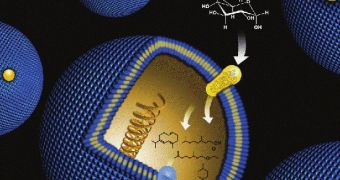Today's technological processes use a variety of chemicals that are synthesized from various molecules, cells and microorganisms for developing a variety of products. In the near future, experts say, it could become possible to engineer specific metabolisms to produce the chemicals we need in large amount.
According to chemical engineering and renowned metabolic engineer Jay Keasling, this is the way of the future. He says that we are currently learning how to engineer whatever organism we need in a manner that will see it perform a single function.
The main consequence of that is a reduction in wastes. Generally, when a bacteria synthesized a drug, for example, it does not do it as its primary function, but as a byproduct.
But, if bioengineers are capable of modifying the organism so that producing the drug molecules becomes its primary function, than production efficiency would increase considerably.
Designing and creating molecules, cells and microorganisms is no longer a thing of science-fiction, but an immediate, verifiable reality. Keasling believes that now is the time to put this knowledge to work.
The expert is the CEO of a US Department of Energy (DOE) bioenergy research center called the Joint BioEnergy Institute (JBEI). In addition, he holds joint appointments with the Lawrence Berkeley National Laboratory (Berkeley Lab) and the University of California in Berkeley (UCB).
His work at Berkeley Lab revolves around keeping an eye on the biosciences research programs that are being carried out by JBEI. At UCB, he is the director of the Synthetic Biology Engineering Research Center, and also the Hubbard Howe Jr. distinguished professor of biochemical engineering.
He considers metabolic engineering to be perhaps the most important field in modern biotechnology, and ponders on its potential in a new study called “Manufacturing molecules through metabolic engineering,” which appears in the December 2 issue of the top journal Science.
“Continued development of the tools of metabolic engineering will be necessary to expand the range of products that can be produced using biological systems,” the expert argues in the paper.
“However, when more of these tools are available, metabolic engineering should be just as powerful as synthetic organic chemistry, and together the two disciplines can greatly expand the number of chemical products available from renewable resources,” he goes on to say.
The expert explains that metabolic engineering largely focuses on gene alteration and metabolic pathway modification in cells or microorganisms such as bacteria. The end goal is to boost the production of specific substances.
“To date, microbial production of natural chemical products has been achieved by transferring product-specific enzymes or entire metabolic pathways from rare or genetically intractable organisms to those that can be readily engineered,” Keasling adds.
“Production of non-natural specialty chemicals, bulk chemicals, and fuels has been enabled by combining enzymes or pathways from different hosts into a single microorganism, and by engineering enzymes to have new function,” he adds.
“In any future, metabolic engineering will soon rival and potentially eclipse synthetic organic chemistry,” the expert concludes.

 14 DAY TRIAL //
14 DAY TRIAL //